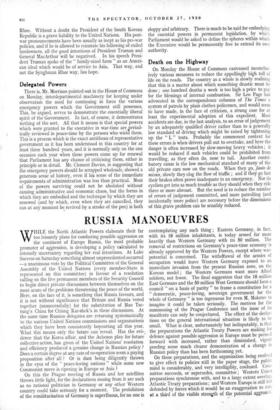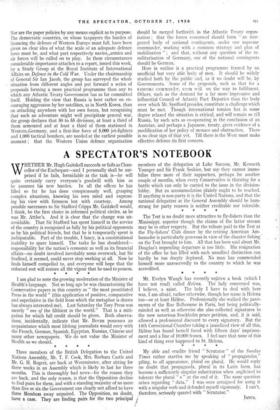RUSSIA MANOEUVRES
WH ILE the North Atlantic Powers elaborate their far too leisurely plans for combating possible aggression on the continent of Europe Russia, the most probable promoter of aggression, is developing a policy calculated to intensify uncertainty regarding her real intentions. At Lake Success on Saturday something almost unprecedented occurred —a unanimous vote by the Political Committee of the General Assembly of the United Nations (every member-State is represented on this committee) in favour of a resolution calling on the five permanent members of the Security Council to begin direct private discussions between themselves on the most acute of the problems threatening the peace of the world. Here, on the face of it, is something that Russia favours, and it is not without significance that Britain and Russia voted together (unsuccessfully) for the substitution of Mao Tse- tung's China for Chiang Kai-shek's in these discussions. At the same time Russian delegates are returning systematically to the various United Nations commissions and organisations which they have been consistently boycotting all this year. What this means only the future can reveal. Has the evi-i dence that the Korea affair, and the Acheson plan for future collective action, has given of the United Nations' resolution and efficiency produced a genuine change in Russian policy ? Does a certain degree at any rate of co-operation seem a paying proposition after all ? Or is dust being diligently thrown in the eyes of the " peace-loving nations " while some new Communist move is ripening in Europe or Asia ?
On this the Prague meeting of Russia and her satellites throws little light, for the declarations issuing from it are such as no rational politician in Germany or any other Western country could take seriously for a moment. The prohibition of the remilitarisation of Germany is superfluous, for no one is contemplating any such thing ; Eastern Germany, in fact, with its 18 million inhabitants, is today armed far more heavily than Western Germany with its 50 million. The removal of restrictions on Germany's peace-time economy is already approved by the Western Powers, except where war- potential is concerned. The withdrawal of the armies of occupation would leave Western Germany exposed to an immediate invasion from the present Russian zone, on the Korean model ; the Western Germans want more Allied soldiers, not fewer. The final suggestion that the 18 million East Germans and the 50 million West Germans should form a council " on a basis of parity " to frame a constitution for a " democratic, peace-loving, sovereign government for the whole of Germany " is too ingenuous for even M. Molotov to imagine it could be taken seriously. The motives for the summoning of the Prague Conference and the issue of its manifesto can only be conjectured. The effect of the declar- tions on the general international situation is likely to be small. What is clear, unfortunately but indisputably, is that the preparations the Atlantic Treaty Powers are making for defence against possible aggression in Europe must be pressed forward with increased, rather than diminished, vigour pending some much clearer demonstration of a change in Russian policy than has been forthcoming yet. On those preparations, and the organisation being evolved to give effect to policies still in the paper stage, the public mind is considerably, and very intelligibly, confused. Com- mittee succeeds, or supersedes, committee ; Western Union preparations synchronise with, and to a large extent overlap, Atlantic Treaty preparations ; and Western Europe is still' left defended by forces which it would be an exaggeration to rate at a third of the visible strength of the potential aggressm Nor are the paper policies by any means explicit as to purpose. The democratic countries, on whose taxpayers the burden of financing the defence of Western Europe must fall, have been given no clear idea of what the scale of an adequate defence force must be, and what part respectively navies,,armies and air forces will be called on to play. In these circumstances considerable importance attaches to a report, issued this week, by a Study Group at the Royal Institute of International Affairs on Defence in the Cold War. Under the chairmanship of General Sir Ian Jacob, the group has surveyed the whole situation from different angles and put forward a series of proposals forming a more practical programme than any to which any Atlantic Treaty Government has so far committed itself. Holding the view that Russia is bent rather on en- couraging aggression by her satellites, as in North Korea, than on attacking anywhere with her own forces, but recognising that such an adventure might well precipitate general war, the group declares that 50 to 55 divisions, at least a third of them armoured and at least a third of them stationed in Western4Germany, and a first-line force of 5,000 jet-fighters and 1,000 tactical bombers, are needed at the earliest possible moment ; that the Western Union defence_ organisation should be merged forthwith in the Atlantic Treaty organ- isation ; that the forces concerned should form " an inte- grated body of national contingents, under one supreme commander, working with a common strategy and plan of mobilisation " ; and that, without any question of the re- militarisation of Germany, one of the national contingents should be German.
Here in outline is a practical programme framed by an unofficial but very able body of men. It should be widely studied both by the public and, as it no doubt will be, by Governments. Some of the proposals, such as that for a supreme commander, seem well on the way to fulfilment. Others, such as the demand for a far more impressive and influential Council of Atlantic Pact Deputies than the body over which Mr. Spofford presides, constitute a challenge which must be met. Though international tension has in some degree relaxed the situation is critical, and will remain so till Russia, by such acts as co-operating in the conclusion of an Austrian, and perhaps a Japanese, treaty, gives evidence of a modification of her policy of menace and obstruction. There is no clear sign of that yet. Till there is the West must make effective defence its first concern.



















 Previous page
Previous page